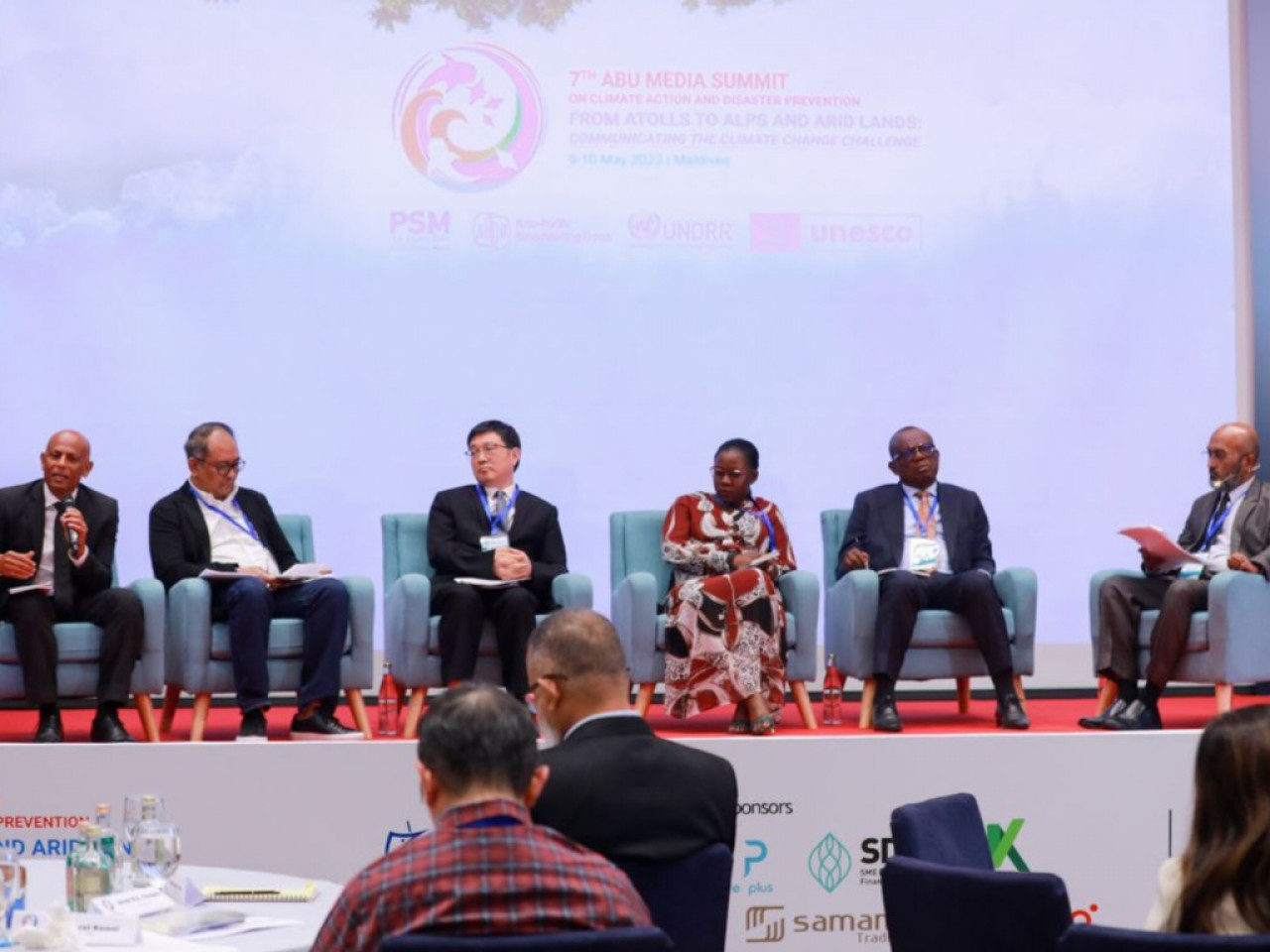Bismillah
My dearest colleagues & attendees, the Maldives’ Minister of Environment, Climate Change and Technology Ms. Aminath Shauna, the Secretary General of the ABU Ahmed Nadheem,
اَلسَّلَامُ عَلَيْكُمْ
and good morning!
And to all our colleagues joining us from abroad let me add, it is a pleasure to have you here with us — welcome to the Maldives!
This really is a proud moment for me personally, professionally, as a broadcaster, and as an emissary of our island nation to have you all accept the invitation to attend this ABU conference on Climate action and disaster prevention.
A majority of you have travelled from countries far away to attend — a true testament to your commitment, given the challenges of navigating post-pandemic air travel alone — thank you for taking the time to bring your expertise to us. Thank you all.
Moments ago you might have seen this face on a beach, inviting you to this conference.
And now here I am, in this conference hall with you. This is possibly the only instance where you cannot credit just the magic of television, and editing, alone. In the Maldives, the sea is never far away — on any island the shore is at most a mere 5 to 10 minutes away.
This is the first time Maldives is hosting the Asian Broadcast Union’s Climate Action and disaster prevention conference.
Initially we had planned the conference to take place before the COVID Pandemic — but nature had other plans.
The last couple of years, with rolling lock downs and other country, and industry, specific challenges the situation did not permit anything substantial to materialize.
However, as broadcasters, and being in media, we were faced with a heightened responsibility. Working in the frontlines to create public awareness on the pandemic was a priority of the highest order — the need to maintain public morale while rationally, logically and scientifically explaining developments proved challenging yet fulfilling.
It has been challenging to cut through the free flow of “alternative facts” and blatantly false “theorizing” throughout the pandemic — as it had previously been with environmental issues. The privilege of using the public airwaves — or public bandwidth if you will — comes with the responsibility of keeping that public sufficiently informed. However with changing public perceptions, not entirely uninfluenced by bad actors, lobby groups, special interests, etc., we find ourselves in an unenviable position — a saturated media space where beliefs, whether right or more right, are reinforced faster than facts.
Informing the public, and spreading awareness, was different the first time we reported on an environment catastrophe with direct physical and emotional relevance to us — this was of course in late 1980’s when the capital city was struck with tidal waves.
The initial fear that set in was; when you push nature, by dredging and reclaiming land, nature fights back — and our response was the tetrapods you see strewn around the capital which act as wave breakers and are virtually the last line of defence protecting more than a third of the nation’s population from essentially being washed away.
Later we would be told, with a great measure of authority; that sea levels could rise — more than 12 inches in the next 20 years — which, luckily for us, there was no such rise because as it turns out the global ecosystem has her redundancies too.
However, our messaging on the possible rise may have been too simplistic or sensationalist and a portion of the public are left to wonder;
Where those bad predictions?
Or
Did we manage to mitigate the issue?
Or
Were we off the mark entirely?
These are the kind of challenges the media needs to address when we seek to connect, and reconnect, with our public. They need a breath of information — the challenge being to be concise and comprehensive over time.
Our current generation is more aware than before, have nuanced perspectives that’s very different from the time when we initially broached the issues of climate change and the environment and are more ready to be the change the world needs them to be.
This two-day conference with, panels and expert opinions — featuring speakers with insight and hands on experience — will not solve our problems overnight. But I look forward to it being an important footnote of our progress in finding the right solutions.
We as media/ broadcasters must regain the public trust on the true narrative of climate issues, the environment and the disasters we face because of human negligence.
Our solutions need to encourage transparency above all — even as we talk about the merits of environmental projects, we should be willing and able to discuss that they are largely funded by the world’s biggest polluters — we cannot afford to, once again, undermine our voices by “soft-pedalling” issues that will set audience perspectives.
I look forward to the proper work, and its result, that will happen over the course of the next two days and I hope all of you are as excited as I am.
I wish you all a very enjoyable, productive, experience and hope that you are challenged in the best ways possible over today and tomorrow.
I thank the ABU — Nadheem thank you and your team for your support — and I am grateful to my PSM team for their attention to detail in everything leading up to this moment as well as your arrangements for the next two days — you have truly made us proud.
Thank you and Godspeed.



